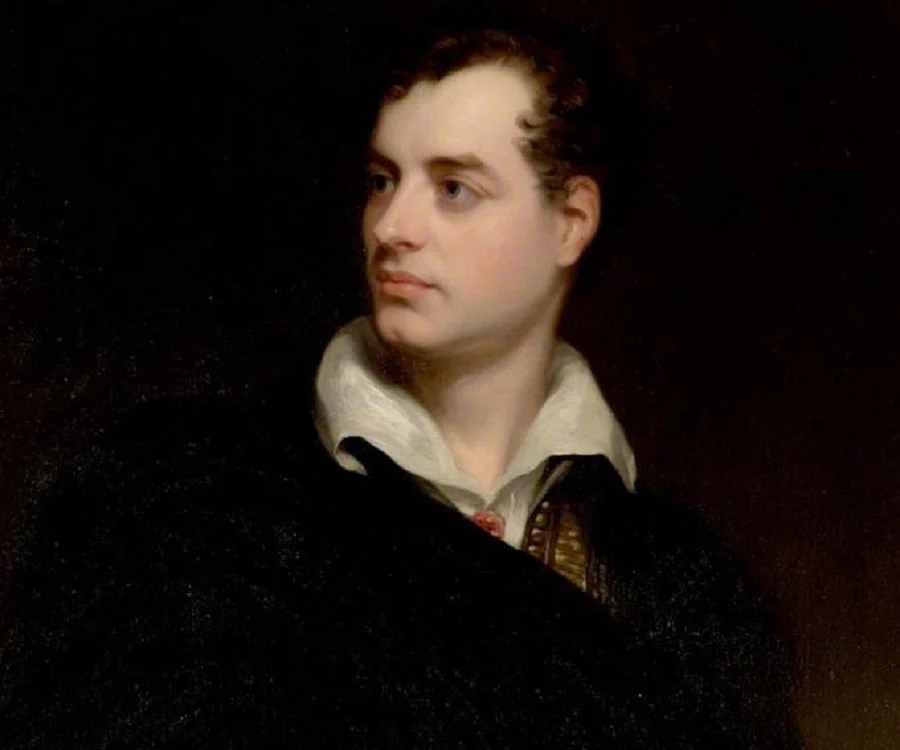Lord Byron, whose full name was George Gordon Byron, 6th Baron Byron, was a prominent English poet and became a leader in the Romantic Period, alongside contemporaries like William Wordsworth, John Keats, Percy Bysshe, and Mary Shelley.
He was born on January 22, 1788, in London, England. Byron’s life and works left a lasting impact on English literature and the cultural landscape of the 19th century. He was the sole offspring of Captain John Byron, known as ‘Jack,’ a reckless and irresponsible gambler, and his second spouse, Catherine Gordon, a Scottish heiress.
Byron’s most famous works include the narrative poems “Childe Harold’s Pilgrimage,” “Don Juan,” and “The Giaour.” He is also known for his shorter poems like “She Walks in Beauty” and “When We Two Parted.”
Education: He attended Harrow School and later Trinity College, Cambridge where he forged a deep friendship with the younger John Edleston. After Edleston’s demise, Byron penned a collection of elegies known as “Thyrza” in his honour. Byron had a strong passion for literature and began writing poetry at a young age and his first poems were published in 1807. However, it was in 1812 that he catapulted to immediate stardom with the publication of “Childe Harold’s Pilgrimage.” This poetic masterpiece took the form of a verse travelogue, narrating the tale of a disillusioned young man navigating a world filled with disillusionment and despair. Byron’s lyrical prowess and introspective themes in this work resonated deeply with readers, cementing his status as a literary sensation.
Romanticism: Referred to as the Romantic movement or Romantic era, emerged as a significant artistic and intellectual movement in Europe during the 18th century (1800 to 1850). Romanticism primarily centered around a heightened focus on emotion and individualism. It celebrated the past and the natural world, favouring medieval themes over classical ones. This movement was, in part, a response to the Industrial Revolution and the prevailing ideals of the Age of Enlightenment. Byron was a central figure in the Romantic literary movement, which emphasized emotion, imagination, and the beauty of nature. His poetry often reflected the Romantic themes of individualism, rebellion, and a fascination with the exotic and the supernatural.
Controversies and Exile: Byron’s personal life was marked by scandal, including his many love affairs, a turbulent marriage, and his bisexuality, which was considered scandalous in his time. These aspects of his life often overshadowed his literary achievements. In 1815, he entered into a marriage with Annabella Milbanke; however, their union was short-lived and eventually annulled. Byron’s tumultuous personal life and love affairs added to his enduring mystique and public fascination. In 1816, he left England for good due to various personal and financial troubles. He travelled extensively throughout Europe, including Switzerland, Italy, and Greece. where he lived for several years in Italy. During his stay in Italy, he frequently visited his friend and fellow poet Percy Bysshe Shelley.
Philhellenism: Byron developed a deep affection for Greece and became a supporter of the Greek War of Independence. Also known as the Greek Revolution or the Greek Revolution of 1821, was a triumphant struggle for freedom fought by Greek revolutionaries against the Ottoman Empire. This conflict took place from 1821 to 1829 and ultimately resulted in the establishment of modern Greece. This historic revolution holds immense significance for Greeks worldwide and this revolution is celebrated by Greeks as Independence Day on 25 March every year.
Death: Byron died in 1824, at the age of 36 from a fever contracted after the first and second sieges of Missolonghi in Greece, leading a campaign during the Greek War of Independence war. For this reason, Greeks revere him as a folk hero. His death was a significant loss to the literary world.
Lord Byron’s works continue to be widely read and studied today. He is celebrated for his lyricism, satirical wit, and contributions to Romantic literature. Byron’s life and poetry have also inspired numerous biographies, films, and adaptations. Byron’s poetry had a profound impact on subsequent generations of writers and poets, including Percy Bysshe Shelley, John Keats, and even later authors like Edgar Allan Poe. His work also helped shape the development of the modern antihero in literature.Lord Byron’s literary contributions have earned widespread acclaim for their originality, compelling narrative strength, and profound exploration of the human experience. Additionally, his unorthodox way of life and defiant disposition have left an indelible mark, making him an inspirational figure for numerous young individuals.
